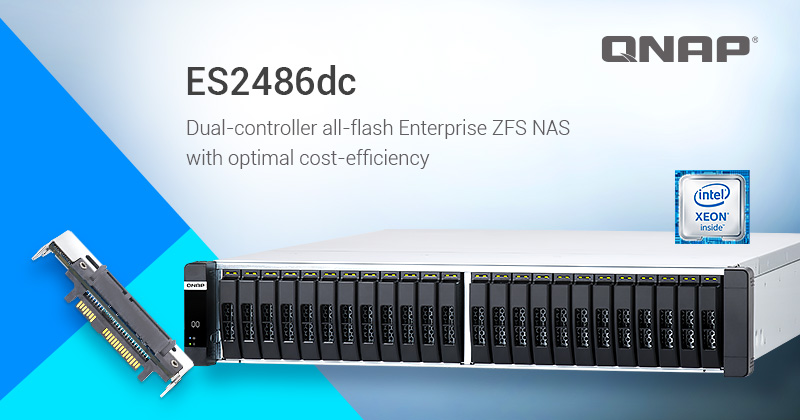To meet growing demands for all-flash storage systems in high-end storage, QNAP® Systems, Inc., has added the new 24-drive bay all-flash storage solution ES2486dc to its Enterprise ZFS NAS series. The ES2486dc is QNAP’s first high-availability NAS with all-flash arrays that feature dual controllers with Intel® Xeon® D-2142IT processors to provide excellent I/O throughputs along with 10GbE connectivity. Driven by the flash-optimized QES 2.1.1 operating system that uses ZFS and includes the support of block-based inline data deduplication and inline compression, the ES2486dc provides future-proof IT architecture with flash storage to fulfill mission-critical file servers, virtualization servers, and commercial cloud applications.
“The all-flash ES2486dc reduces performance bottleneck, and its dual controllers enhance system reliability for uninterrupted mission-critical enterprise tasks and productivity,” said David Tsao, Product Manager of QNAP, adding “The robust ES2486dc further incorporates the powerful ZFS, making it an excellent integration of hardware and software as a capable, trustworthy, and cost-efficient all-flash storage solution for businesses.”
Featuring a dual active-active controller architecture, the ES2486dc ensures near-zero downtime high availability. Each controller provides four 10GbE SFP+ LAN ports and eight RDIMM slots for up to 512 GB memory. Battery-protected DRAM write to cache data protection helps reduce data loss risks. Two PCIe slots support 10GbE/25GbE/40GbE network cards to boost virtualization and other bandwidth-demanding applications. Users can also install a SAS expansion card for connecting multiple EJ1600 v2 expansion enclosures to expand potential storage capacity to over 1 PB. Leveraging the optional QDA-SA3 6 Gbps SAS to SATA drive adapter, the ES2486dc allows the usage of a SATA 6 Gbps SSD in the 2.5-inch SAS drive bay, enabling SATA SSDs to share the SAS dual-port advantages for fault-tolerant enterprise storage environment and assisting organizations to establish a high-performance yet cost-effective all-flash storage system.
The ES2486dc Enterprise ZFS NAS features the QES operating system that is optimized for all-flash storage arrays. It performs efficient data reduction with inline data deduplication and inline data compression, beneficial for reducing I/O and SSD storage consumption and significantly extending SSD lifespan. More advanced business features include self-healing for silent data corruption, near-unlimited snapshot versions, SnapSync for instant remote backups, and Quality of Service to ensure consistent primary storage performance.
The ES2486dc supports VMware®, Microsoft® and Citrix® virtualization, and SnapSync supports VMware Site Recovery Manager (SRM) to offer enterprise-class remote backup and disaster recovery solution for virtual applications. The support of iSER optimizes VMware performance, and the compatibility for OpenStack® Cinder and Manila file sharing services provides businesses with a flexible, easy-to-use, and low-cost storage solution for OpenStack environments.
Key specification
- ES2486dc-2142IT-96G: Intel® Xeon® D-2142IT 8 cores/16 threads 1.9 GHz processor (burst up to 3.0 GHz), 96 GB DDR4 ECC memory (48 GB per controller)
- ES2486dc-2142IT-128G: Intel® Xeon® D-2142IT 8 cores/16 threads 1.9 GHz processor (burst up to 3.0 GHz), 128 GB DDR4 ECC memory (64 GB per controller)
Active-Active dual-controller system, 2U rackmount NAS; 24x 2.5-inch SAS 12 Gbps/6 Gbps hard drives or SSDs; 2x PCIe Gen 3 x8 slots; 4x 10GbE SFP+ LAN ports; 3x Gigabit ports; 2x USB 3.0 ports; 770W redundant power supplies
Credit to source, information taken from:
QNAP Systems Inc. (2020). QNAP Rolls Out All-Flash Array Enterprise ZFS NAS, Featuring Intel Xeon D Dual Controllers for Inline Deduplication and Optimized SSD Performance [online] QNAP Systems, Inc. - Network Attached Storage (NAS).
Available at: https://www.qnap.com/en/news/2020/qnap-rolls-out-all-flash-array-enterprise-zfs-nas-featuring-intel-xeon-d-dual-controllers-for-inline-deduplication-and-optimized-ssd-performance [Accessed 05 February 2020].


